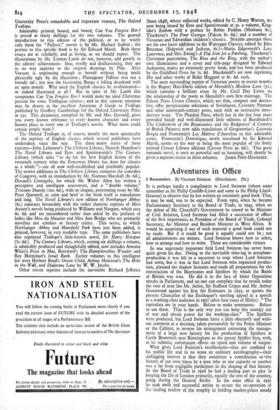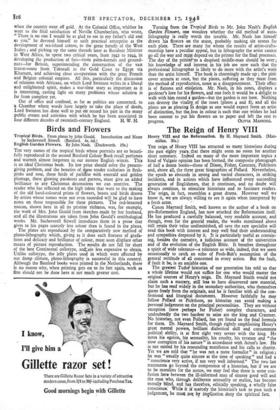Adventures in Office
IT is perhaps hardly a compliment to Lord Swinton (whom some remember as Sir Philip Cunliffe-Lister and some as Sir Philip Lloyd- Graeme) to observe that he has written an extremely good book. That, it may be said, was to be expected. From 5920, when he became Parliamentary Secretary to the Board of Trade, to 1945, when on the defeat of Mr. Churchill's Government he ceased to be Minister of Civil Aviation, Lord Swinton had filled a succession of offices of the first importance; as President of the Board of Trade, Colonial Secretary, Air Minister and Resident Minister in West Africa. It would be surprising if out of such material a good book could not be made. But if it could be good it equally could not be ; not all administrators are writers. Lord Swinton knows how to select, how to arrange and how, to write. These are considerable virtues.
In one supremely important field Lord Swinton has never been quite given his due. Owing to the inevitable time-lag in aeroplane- production it was left to a successor to reap where Lord Swinton had sown, but it was in fact Lord Swinton who organised produc- tion, planned the shadow factories and made all preparations for the &mstruction of the Hurricanes and Spitfires by which the Battle of Britain was won. He did it in the face of bitter Opposition attacks in Parliament, and no one can complain that he recalls today the vote of men like Mr. Attlee, Sir Stafford Cripps and Mr. Arthur Greenwood against his first Air Estimates in 5935, or quotes the present Chancellor of the Exchequer's startling appeal in a speech to a working-class audience in 5937 (after four years of Hitler): "The capitalists are in your hands. Refuse to make armaments. Refuse to use them. That is the only way you can keep this country out of war and obtain power for the working-class." The Spitfires were produced, but Lord Swinton hints a little obscurely and. with- out comment at a decision, taken presumably by the Prime Minister or the Cabinet, to reverse his arrangement entrusting the manage- ment of a large new factory for the production of Spitfires at Castle Bromwich near Birmingham to the parent Spitfire firm, with, as he submits, unfortunate effects on speed ,and volume of output.
What gives Lord Swinton's recollections—they are confined to his public life and in no sense an ordinary autobiography—their unflagging interest is that they constitute a Contribution to *the history of our own times by a man who in one capacity or another was a far from negligible participant in the Shaping of that history. At the Board of Trade in 1926 he had a leading part to play in keeping the life of London primarily, equally the rest of the country, going during the General Strike. In the same office in 1931 he took swift and successful action to secure the co-operation of the leading traders of the coujitty in holding market-prices steady
when the country went off gold. At the Colonial Office, whither he went to the filial satisfaction of Neville Chamberlain, who wrote, "There is no one I would be as glad to see in my father's old seat as you," he devoted himself to such practical enterprise as the development of sea-island cotton, to the great benefit of the West Indies ; and picking up the same threads later as Resident Minister in West Africa, he spent two critical years, from 1942 to 1944, in developing the production of fats—from palm-kernels and ground- nuts—for Britain, superintending the construction of the vast transit-route from Takoradi in the Gold Coast to Egypt via Khartum, and achieving close co-operation with the great French and Belgian colonial empires. All this, particularly the discussion of relations with Africans, on which Lord Swinton writes in a liberal and enlightened spirit, makes a war-time story as important as it is interesting, casting light on many problems whose solution is far from complete yet.
Out of office and confined, as far as politics are concerned, to a Chamber where words have largely to take the place of deeds, Lord Swinton has done well to put on record his part in the many public events and activities with which he has been associated in four different decades of twentieth-century England. H. W. H.



































 Previous page
Previous page